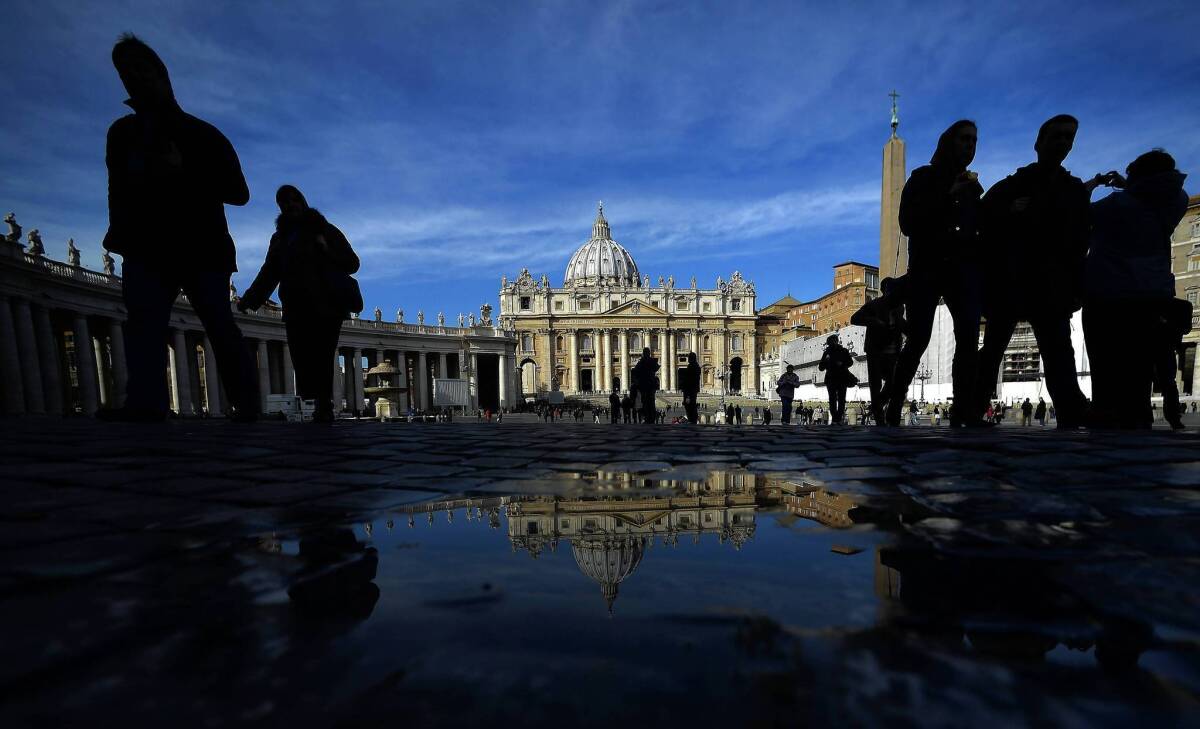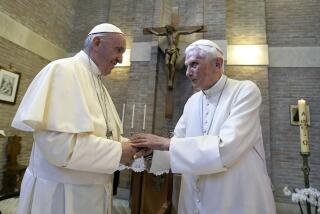Popes as next-door neighbors

VATICAN CITY â One day soon, perhaps on a fine morning this spring, a new pope strolling through the Vaticanâs beautifully tended gardens may run into something that few, if any, of his predecessors ever encountered: another pope.
Technically, of course, there will be only one reigning pontiff, the man elected by the College of Cardinals after Benedict XVI steps down Feb. 28. But some papal aura will no doubt cling to the older, silver-haired former pope, who was deemed Godâs chosen representative. And therein may lie a rub.
Benedictâs shocking decision to resign has raised a host of unexpected â and unprecedented â issues, not least the influence that a previous pope could, would or should exercise after his anointed successor is in place.
Moreover, his decision to live out his days within the precincts of the Vatican, in a vacant monastery, makes it highly likely that he and his replacement will literally cross paths, giving rise to a potentially awkward situation.
âItâs the first time in history that we will have inside the Vatican two popes, the old one and the new one,â said Marco Ansaldo, the Vatican correspondent for Italyâs La Repubblica newspaper. âI donât think that there will be a direct conflict. But the new pope ⌠will know that heâs watched by the old one.â
Benedict is the first pontiff in nearly 600 years to resign, and the first in even longer to do so willingly. In many ways, the situation is akin to a constitutional crisis brought on by the abdication of a monarch. Thereâs no script, no simple protocol. What do you even call the former occupant of the throne â in this case the throne of St. Peter?
The Vaticanâs genial spokesman, Father Federico Lombardi, candidly acknowledged at a news conference Tuesday that he had no answers yet to some basic questions, including what would be done with the papal ring, which is used as an official seal and by tradition is destroyed when a pontiff dies.
Lombardi said the retired pope would continue to be known as Benedict XVI and would not return to being a cardinal. âIt is difficult to call him cardinal after he was pope,â Lombardi said. All popes are automatically appointed bishop of Rome, and Lombardi said Benedict would become bishop emeritus.
More relevant for the Catholic faithful is whether the new popeâs teaching and authority might somehow be undermined by the very presence of his predecessor, perhaps leading to a dangerous schism.
Some believers and clerics might insist, for example, that Benedictâs vocation as Holy Father, the leader of the flock, is not his to give away, however voluntarily. As Pope Paul VI once put it, paternity cannot be resigned.
âThe idea of two popes could be really problematic,â said Antonio Sabetta, a professor at Pontifical Lateran University in Rome.
Tantalizingly, Benedict has been working in these last days of his papacy on a new encyclical, the document of the highest importance a pope can produce, on the subject of faith. It wonât be finished before his retirement, Lombardi said, and therefore will go unpublished, at least in encyclical form.
But if it appears in a book, thereâs a danger that it or other such writings could muddy the waters for the new pope, who might feel constrained by Benedictâs deeply intellectual teachings or intimidated by what even critics concede is his elegant, limpid prose. No matter how well-intentioned, such work could have the effect of bigfooting his successor.
âIf he starts to write about sensitive topics pertaining to, say, the church in the world, this will be a problem and create confusion in people, because who do we follow: all the popes, the previous one, the pope whoâs most similar to our way of thinking?â Sabetta said.
Sabetta thinks the shy, scholarly Benedict will probably strive to avoid any hint of tension, disagreement or conflict with his successor, both for the good of the church and to allow himself to enjoy a quiet retirement out of the public eye, with his beloved books and pampered cat for company.
âConsidering Pope Benedict, who is really interested in studying and praying, I think it wonât be a problem,â Sabetta said. âPope Benedict is a very humble man.... I think he will almost disappear from the scene.â
The Vatican said Benedict would maintain an active schedule until his retirement, including his usual weekly audience Wednesday morning and the annual Ash Wednesday service in the afternoon.
Lombardi revealed for the first time that the pope had been fitted with a pacemaker. But he said that neither the pacemaker nor any specific illness had prompted the decision to resign, which Benedict ascribed to his generally declining health. He is 85.
The conclave to choose a new leader for the worldâs 1 billion Roman Catholics will probably convene around mid-March. The Vatican has said Benedict has pledged not to participate or interfere in the election.
But his influence cannot help but loom large, if only because he remains alive and around. Ironically, the pontiff who many thought would spend his papacy overshadowed by his charismatic but dead predecessor, John Paul II, might now cast a bigger shadow over his own successor.
Indeed, his replacement could well be someone in his mold: Many of the cardinals eligible for the papacy were handpicked by Benedict and share his conservative theology and outlook. That would make self-effacement in retirement even easier for him.
When bishops were first ordered to retire after a certain age, Sabetta and other experts noted, there was similar fear of sowing division within dioceses between devotees loyal to the former bishop and those who welcomed the new. But that process was quickly accepted and became the norm.
After stepping down, Benedict will live temporarily in the papal summer residence at Castel Gandolfo, south of Rome, before he gets himself to a nunnery. Builders are at work now renovating buildings at the monastery that once housed nuns in the Vatican Gardens, which will become his new home.
Thereâs a private chapel and a patch of soil where the nuns grew citrus trees and roses, according to the Associated Press.
The papal apartment he once occupied will not be far away, but Benedict will settle in, and the Vatican and the Catholic faithful will adjust to the idea of two popes in one place, said John Allen, a veteran Vatican watcher for the National Catholic Reporter.
âI donât want to diminish the fact that itâs going to be awkward for a while. People are going to need some time,â he said. âBut in the long term, people will get their minds around the idea that thereâs a new sheriff in town.â
Special correspondent Tom Kington contributed to this report.
More to Read
Sign up for Essential California
The most important California stories and recommendations in your inbox every morning.
You may occasionally receive promotional content from the Los Angeles Times.











